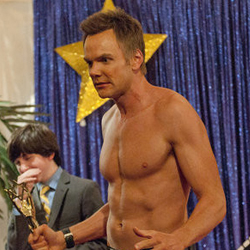 Egos can be dangerous things. Inflated, they can make us forget how connected and indebted we are to the people we love. Bruised and shattered, they bring us crashing back down to the glaring reality that we aren’t perfect, flawless, or even close to ideal. The tough part is that after floating so high above such a difficult reality and suddenly finding ourselves back in the middle of it, it can take a while to catch our bearings. We suddenly have to navigate our own shortcomings again, and we’ve grown so unaccustomed to them that we don’t quite know how to do that. And what we do in that disoriented haze can have disastrous effects—like going into a blind rage and ripping off our clothes at a cinephile’s bar mitzvah.
Egos can be dangerous things. Inflated, they can make us forget how connected and indebted we are to the people we love. Bruised and shattered, they bring us crashing back down to the glaring reality that we aren’t perfect, flawless, or even close to ideal. The tough part is that after floating so high above such a difficult reality and suddenly finding ourselves back in the middle of it, it can take a while to catch our bearings. We suddenly have to navigate our own shortcomings again, and we’ve grown so unaccustomed to them that we don’t quite know how to do that. And what we do in that disoriented haze can have disastrous effects—like going into a blind rage and ripping off our clothes at a cinephile’s bar mitzvah.
There but for the grace of god, am I right?
This week’s episode of Community, “Contemporary Impressionists,” is all about ego. Jeff’s anti-anxiety medication leads him to be even more narcissistic than usual, whisking him away into a never-never-land where he feels entitled to all the praise he gets (and becomes outraged at the praise he doesn’t). Meanwhile, Abed becomes so wrapped up in his own never-never-land of celebrity impersonators and film scene re-enactments that he unwittingly puts both himself and the rest of the study group in potential danger. Jeff at least seems to be aware that his ego is a problem and actively seeks Britta’s help in dealing with it (perhaps a healthy side effect of his therapy); but at episode’s end, Abed has retreated even more into himself—so far into himself, in fact, that he begins to hear a very dark internal voice: that of Evil Abed.
And what Evil Abed says to Abed is, in fact, the essence of egotism: that it’s possible—even preferable—to be alone. He points out that “there are many advantages to traveling by yourself: you can drive faster, change direction, and the only pee breaks are yours.” While Jeff has been learning over the course of the show the utter importance of being part of a community and tempering his own interests in consideration of others’ (or, to put it in Evil Abed’s terms, of accommodating other people’s pee breaks), Abed seems to be on a reverse trajectory. He’s gained friendship and love and awesome experiences from the people around him, but his inability to process reality as practically and directly as them leads him to take shelter in his own, cut-off fantasies. And when Troy, who until now has been a willing and enthusiastic participant in those fantasies, begins to show some reluctance… Abed cuts an invisible cord and floats away from his friend, not out of spite, but out of self-preservation—which is a whole other flavor of ego.
Seeing Troy’s handshake hang woefully incomplete in the air is an intensely sad moment, and it’s a testament to the show’s creators that such a simple scene can pack such a significant emotional punch. Similarly, seeing Abed accept Evil Abed as his co-pilot—while perhaps not quite as visually evocative as this moment—clearly signifies a dark interior reality that most sitcoms wouldn’t touch with their big sister’s toe. Yet another reason why Community’s one of the best shows on TV.
Also, I was going to say “I told you so” about the Chang-Kony comparisons, but then I realized that, 1) I would only be stroking my own ego, and 2) I never actually bothered to write my prediction of said comparisons because I was too lazy. God I really am a shitty person. Must… find… bar mitzvah to crash…

1 comment
Magical Friendship Hats: Fantasy and Shared Meaning in NBC’s “Community” | The Narratician says:
Jan 23, 2014
[…] Talk About Community “Regional Holiday Music” Review “Contemporary Impressionists” Review Season Three […]